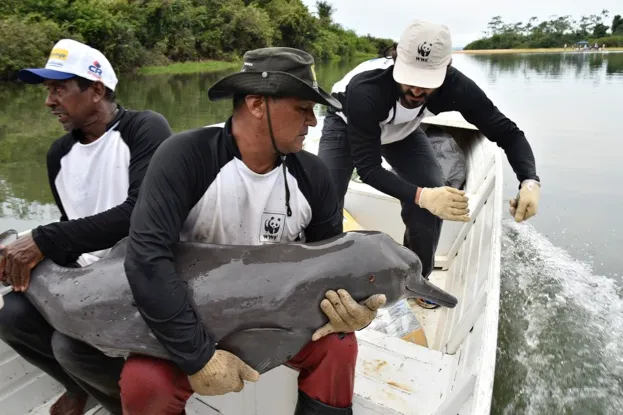One of the Amazon river dolphins which was tagged in Brazil © WWF
As part of a WWF project, ten Amazon river dolphins in Brazil, Colombia and Bolivia have been tagged to allow researchers to track these mysterious animals.
River dolphins are widely known for their distinctive pink colour, but the IUCN Red List recognises them as Data Deficient, with little known about their movements or population numbers.
The project – a combination of blood samples and small transmitters – has never been carried out on this river dolphin species before, and will provide an insight into how threats to the species are affecting their behaviour.
“The river dolphin is an icon of the Amazon and one that is facing an uncertain future,” says WWF conservation specialist Marcelo Oliveira.
“Satellite tracking will help us understand the life of river dolphins better than ever before, helping to transform our approach to protecting them.”

The Amazon river dolphins were captured and fitted with small transmitters © WWF
As a result of new dam development, many dolphins are becoming cut off from other individuals, preventing social interaction and successful breeding. Mercury poisoning from small-scale gold mining and illegal fishing also threaten the long-term survival of the species.
WWF will utilise this new data to increase its efforts to conserve river dolphins across the Amazon. If the research proves successful, more individuals may be tagged in the future.
To minimise disturbance, the dolphins were captured by specialists in areas recommended by local people, with the tagging process taking only 15 minutes.
As well as this satellite tagging project, WWF will maintain communication with communities in the Amazon and encourage the initiation of new protected areas, to ensure the survival of these mysterious cetaceans.
Read more wildlife news stories in BBC Wildlife Magazine
p.p1 {margin: 0.0px 0.0px 0.0px 0.0px; font: 13.3px Tahoma; -webkit-text-stroke: #000000}
p.p2 {margin: 0.0px 0.0px 0.0px 0.0px; font: 13.3px Tahoma; -webkit-text-stroke: #000000; min-height: 16.0px}
span.s1 {font-kerning: none}
